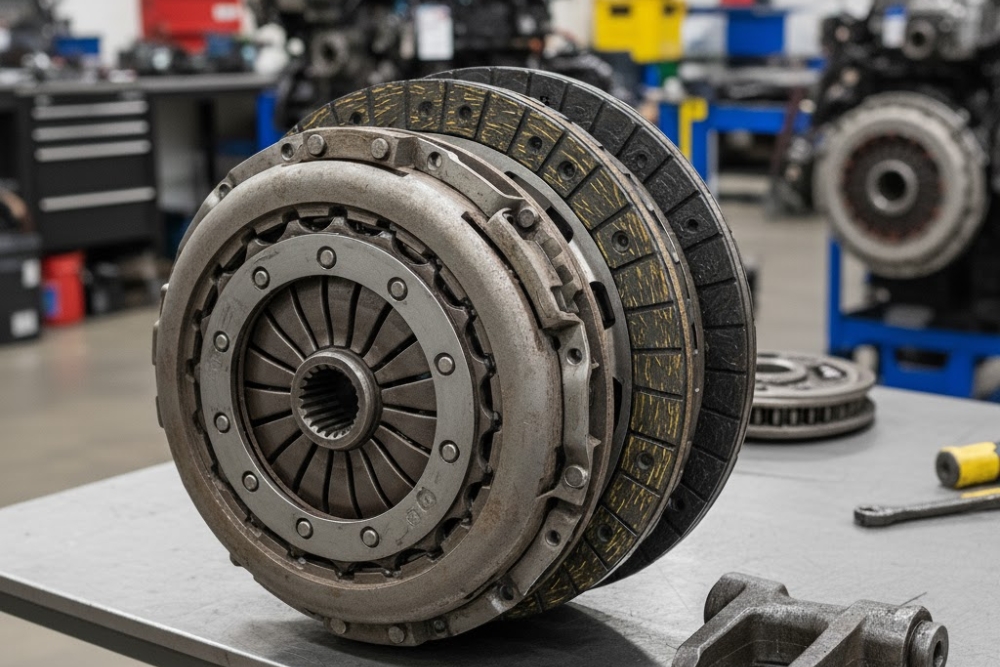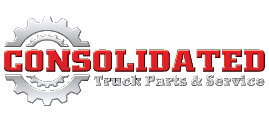Clutch failure in a semi-truck often starts with subtle signs. Slipping gears, grinding shifts, or a clutch pedal that suddenly feels “off” may not seem like urgent problems, but they are often the first signals of deeper issues.
In Lafayette, LA, where trucks carry heavy loads and run long routes through the Gulf Coast corridor, drivetrains are under constant pressure. Ignoring small clutch symptoms can quickly escalate into major downtime, expensive repairs, and even transmission damage.
At Consolidated Truck Parts & Service, we’ve seen firsthand how early detection and maintenance protect both your truck and your bottom line.

This guide will walk you through the most common semi-truck clutch problems, how to recognize early warning signs, simple preventative steps you can take, and when it is time to schedule professional Lafayette truck clutch repair to keep your rig safe, reliable, and profitable.
Clutch Basics That Make or Break Your Truck’s Reliability
The clutch is one of the hardest-working components in a semi-truck. Its job is to connect and disconnect the engine from the transmission, making smooth gear shifts possible while handling the immense torque of heavy-duty driving. Every time you press the clutch pedal, thousands of pounds of force are being managed and released.
But even the toughest clutches eventually wear down. If maintenance is neglected, a failing clutch can lead to:
- Transmission damage requiring full rebuilds.
- Breakdowns on Louisiana highways that throw off delivery schedules.
- Increased fuel consumption as the clutch slips and power is lost.
- Dangerous driving conditions if gears grind or fail to engage under load.
In short, your clutch doesn’t just affect how your truck feels to drive; it directly impacts your bottom line and your safety.
The Top Signs of Semi-Truck Clutch Problems
Clutches rarely fail overnight. Instead, they send warning signs long before a breakdown happens. Catching these signs early gives you the chance to schedule repairs on your terms, not on the roadside.
1. Slipping Gears
If the engine revs but the truck doesn’t accelerate as it should, your clutch may be slipping. This often happens when the clutch plate can’t grip the flywheel firmly enough. Slipping usually gets worse under heavy loads or on steep grades, both of which are common in Louisiana hauling.
Tip: Don’t wait. Slipping causes more friction and heat, which wears out the flywheel and drives up repair costs.
2. Hard or Crunchy Shifting
Gear changes should be smooth. If they feel forced, grind loudly, or refuse to engage, it could point to worn clutch plates, misalignment, or hydraulic issues.
Why it matters: Continuing to force gear shifts can damage synchronizers inside the transmission. What starts as a clutch problem can quickly become a transmission overhaul.
3. A Pedal That Feels “Off”
The clutch pedal is your first line of feedback. If it feels too spongy, too stiff, or inconsistent, something isn’t right. Hydraulic leaks, worn linkages, or failing bearings may be to blame.
Quick check: Pay attention to pedal feel during your daily inspections. It’s often the first sign of trouble.
4. Strange Smells or Sounds
Burning smells usually indicate a slipping clutch that’s overheating. Grinding, squealing, or rattling noises from the clutch housing point to worn release bearings, warped plates, or misaligned parts.
Driver insight: If your nose or ears pick up on something unusual, trust your instincts. These issues rarely fix themselves.
5. Loss of Power on the Road
If your truck feels sluggish or loses pulling power even though the engine is revving, the clutch may not be fully engaging. This is especially dangerous when navigating Lafayette’s traffic or merging onto interstates.
What Causes Semi-Truck Clutches to Fail?
Understanding the “why” behind semi-truck clutch problems helps prevent them. Common causes include:
- Normal Wear: Clutches are designed to wear over time. It’s expected.
- Overloading: Carrying loads beyond rated capacity speeds up wear dramatically.
- Riding the Clutch: Resting your foot on the pedal, even lightly, increases friction.
- Stop-and-Go Driving: Frequent shifting in traffic heats up clutch plates.
- Poor Maintenance: Ignoring fluid levels, adjustments, and inspections shortens clutch life.
A clutch is built to last hundreds of thousands of miles, but only if it’s properly cared for.
Preventative Maintenance for Longer Clutch Life
Preventative maintenance is the difference between a planned repair and an expensive roadside breakdown. Here’s how to keep your clutch in top shape:
- Schedule Regular Inspections: Have your clutch checked during every preventative maintenance service.
- Adjust When Needed: Many clutches require periodic adjustments to maintain proper clearance.
- Watch Hydraulic Systems: Low or dirty hydraulic fluid will shorten the lifespan of clutch components.
- Educate Drivers: For fleets, driver habits, like riding the clutch, make the biggest difference in how long clutches last.
- Don’t Ignore Early Signs: A small issue today can prevent a much larger repair tomorrow.
At Consolidated, clutch inspections are part of a larger preventative maintenance program that helps fleets reduce downtime and save money.
Clutch vs. Transmission: Knowing the Difference
Clutch and transmission problems often look the same, which is why professional diagnostics matter. Here’s a breakdown:
Symptom Guide
| Symptom | Clutch Issue | Transmission Issue |
|---|---|---|
| Grinding while shifting | Worn clutch plate, bad release bearing | Damaged synchronizers |
| Truck revs but won’t accelerate | Slipping clutch | Internal transmission failure |
| Pedal feels soft or stiff | Hydraulic leak, worn linkage | Not typically related |
| Burning smell | Overheated clutch | Less common |
Because clutches and transmissions work together, transmission repair in Lafayette, LA often starts with a clutch inspection. Catching the root cause early saves thousands in unnecessary repairs. To dive deeper into services designed to protect your truck, visit our dedicated Clutch Repair and Transmission Repair pages.
Lafayette’s Go-To Shop for Clutch and Transmission Service
When your clutch starts to fail, you don’t just need a repair, you need a trusted partner who understands the unique demands of Louisiana trucking. Here’s why drivers choose Consolidated for Lafayette truck clutch repair:
- Generations of Experience: Serving Louisiana drivers since 1957.
- Certified Technicians: Skilled in clutch diagnostics, repair, and transmission service.
- OE-Level Diagnostics: Factory-grade software ensures accuracy across all makes and models.
- Transmission Expertise: From standard gearboxes to complex drivetrains, our Lafayette team is equipped to handle transmission repairs and rebuilds for most makes and models. We service components like Eaton clutches, Spicer drivetrains, and more, backed by the same quality standards trusted across all Consolidated Truck locations.
- Full Parts Inventory: From clutch plates and bearings to flywheels and hydraulic cylinders, we stock what you need.
- 24/7 Emergency Service: Breakdowns don’t wait for business hours, and neither do we.
- Transparent Communication: Regular updates, clear approvals, and fair pricing at every step.
We don’t just fix clutches. We help drivers and fleets protect their trucks, their schedules, and their reputations.
Frequently Asked Questions
What are the signs of a bad truck clutch?
The signs of a bad truck clutch include slipping gears, grinding when shifting, spongy or stiff pedals, strange noises, and a burning smell. Poor acceleration is another common symptom. Addressing these signs early prevents damage to the flywheel or transmission.
How long does a semi-truck clutch last?
A semi-truck clutch typically lasts between 200,000 and 300,000 miles, depending on load weight, driving conditions, and maintenance practices. Fleets that run heavy-duty cycles or long hours may require clutch replacement sooner. Preventative care helps extend clutch life.
What happens if I drive with a bad clutch?
Driving with a bad clutch reduces power, increases fuel use, and can cause major damage to the flywheel and transmission. A failing clutch also puts you at risk of breakdowns on the road. Scheduling repairs quickly is the safest and most cost-effective option.
Where can I get truck clutch repair in Lafayette, LA?
Truck clutch repair is available from certified diesel mechanics in Lafayette, LA, who specialize in diagnosing and repairing heavy-duty drivetrains. Look for shops with experience in clutch service, transmission repair, and preventative maintenance programs to ensure safe and reliable results.
What causes a clutch to wear out quickly?
A clutch can wear out quickly from overloading, riding the clutch pedal, poor adjustment, or lack of maintenance. Driver habits play a big role in clutch lifespan. Training operators on proper use and scheduling routine inspections helps prevent premature failure.
Book Your Clutch and Transmission Service in Lafayette, LA
Your clutch is too important to ignore. At Consolidated Truck Parts & Service in Lafayette, LA, we specialize in diagnosing clutch problems, performing quality repairs, and preventing breakdowns before they happen. With the right care, you stay on the road longer and avoid costly downtime.
Stop by at 2623 SE Evangeline Thruway, Lafayette, LA 70508, call (337) 467-0936, or request your appointment online.
Looking for service closer to home? We proudly serve across Louisiana:
From clutch inspections to full replacements, our experts deliver the reliable service Louisiana fleets depend on.
